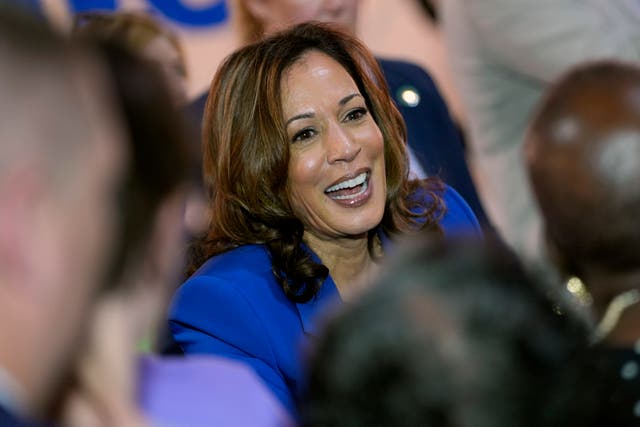Vice President Kamala Harris is entering the Democratic National Convention (DNC) with increased excitement from Democrats and a steady rise in her favourability ratings among Americans as a whole.
About half of US adults — 48% — have a very or somewhat favourable view of Ms Harris, according to a new poll from The Associated Press-NORC Centre for Public Affairs Research.
That is up from 39% at the beginning of the summer, before President Joe Biden’s poor performance in his debate against former president Donald Trump ultimately led him to drop out of the presidential race.
That is not just an improvement for Ms Harris but also from where Mr Biden stood before he dropped out when 38% said they had a favourable opinion of him. It is also somewhat better than the 41% of adults who say they have a favourable opinion of Mr Trump.

The rise in favourability for Ms Harris comes as more Americans overall have formed an opinion about her while the Harris and Trump campaigns rush to define her nascent candidacy. The share saying they do not know enough about her to have an opinion has halved, from 12% in June to 6% now.
The latest measurement is in line with how Americans viewed Ms Harris in early 2021 when she and Mr Biden first took office. It suggests renewed positivity towards Ms Harris — the share of Americans who have a “very favourable” opinion of her has also increased over the same period — but she risks hitting a ceiling as she approaches her previous highest rating.
Since June, Ms Harris’ favourability has slightly risen among some groups that generally already favour the Democratic Party. She has seen slight increases in favourability among Democrats, independents, women and young adults under age 30. There has been no significant movement from black adults or Hispanic adults — other constituencies Ms Harris will likely need the support of in November.
Half of adults under 30 have a very or somewhat favourable view of Ms Harris in the latest poll, up from 34% in June. That comes as more young adults have formed an opinion about her, with the share of adults who say they do not know enough to say shrinking from about two in 10 to roughly one in 10. The number of young adults with an unfavourable view of her has not changed significantly.
Ms Harris has relatively high levels of favourability among black adults, though it has been relatively steady over the last month. Around two-thirds of black adults have a very or somewhat positive view of Ms Harris. That includes around four in 10 who say their opinion of her is “very favourable”. Black adults are more likely than Americans overall to have a favourable impression of Ms Harris.

About six in 10 non-white men and women have a positive view of Ms Harris.
Johnita Johnson, a 45-year-old black woman living in North Carolina, said she plans to vote for Ms Harris in November, but she wants the campaign to be honest and realistic about what it can promise. She has a problem with politicians, generally, who overpromise what they will be able to accomplish in office.
“If (Ms Harris) was able to do exactly what she wants to do and what she says she would do, she would do an awesome job,” Ms Johnson said. “Well, we all know that is not going to go like that. She may get to do some of the things that she wanted to do. Will she do everything? I can’t say that she will. And she can’t promise me that.”
Ms Johnson noted that while Ms Harris is a historic candidate because of her race and sex, it is not something that’s factoring into her support.
“It wouldn’t matter who it was. … As long as they are good and good to us, that’s what matters to me,” Ms Johnson said. “Yes, of course, to a lot of people, it’s exciting because she’s Black and she’s the first woman. But I’m not looking at it.”




Why are you making commenting on The Herald only available to subscribers?
It should have been a safe space for informed debate, somewhere for readers to discuss issues around the biggest stories of the day, but all too often the below the line comments on most websites have become bogged down by off-topic discussions and abuse.
heraldscotland.com is tackling this problem by allowing only subscribers to comment.
We are doing this to improve the experience for our loyal readers and we believe it will reduce the ability of trolls and troublemakers, who occasionally find their way onto our site, to abuse our journalists and readers. We also hope it will help the comments section fulfil its promise as a part of Scotland's conversation with itself.
We are lucky at The Herald. We are read by an informed, educated readership who can add their knowledge and insights to our stories.
That is invaluable.
We are making the subscriber-only change to support our valued readers, who tell us they don't want the site cluttered up with irrelevant comments, untruths and abuse.
In the past, the journalist’s job was to collect and distribute information to the audience. Technology means that readers can shape a discussion. We look forward to hearing from you on heraldscotland.com
Comments & Moderation
Readers’ comments: You are personally liable for the content of any comments you upload to this website, so please act responsibly. We do not pre-moderate or monitor readers’ comments appearing on our websites, but we do post-moderate in response to complaints we receive or otherwise when a potential problem comes to our attention. You can make a complaint by using the ‘report this post’ link . We may then apply our discretion under the user terms to amend or delete comments.
Post moderation is undertaken full-time 9am-6pm on weekdays, and on a part-time basis outwith those hours.
Read the rules hereLast Updated:
Report this comment Cancel